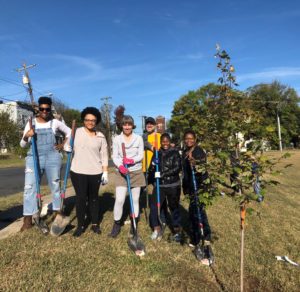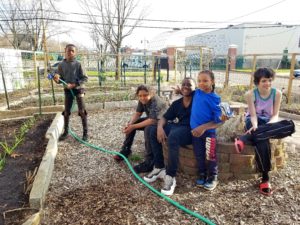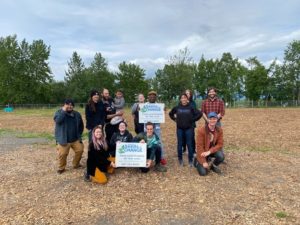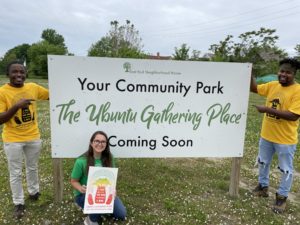BY TFN STAFF
They are turning a defunct hospital site into an urban sustainability farm and an empty field into an outdoor classroom. They are working to shield community gardens from the pressures of development. And they are striving to help underserved neighborhoods become greener, cooler and more resilient to the ravages of climate change.
The newest round of Partners for Places grantees, announced today by The Funders Network (TFN) and the Urban Sustainability Directors Network (USDN), showcases the creative and collaborative efforts happening at the local level to create equitable and sustainable communities.
In all, six U.S. communities will receive more than $380,000 in Partners for Places grants, plus matching funds from local partners, to support sustainability efforts that focus largely on advancing frontline community needs and priorities.
“These projects show how lifting up the voices of those disproportionately impacted by climate change — low-income communities and people of color — can help drive innovative, equitable approaches to complex issues,” said Pat Smith, president and CEO of TFN. “By bringing together local governments, place-based funders and frontline community-led groups, these grantees are also building relationships that will fuel even more action and collaboration at the grassroots level.”
The six communities receiving this latest round of Partners for Places grants are: Anchorage, Alaska; Boulder County and the cities of Boulder and Longmont, Col.; Chattanooga, Tenn.; Cleveland, Ohio; Richmond, Va., and Rochester, N.Y.
Meet the New Grantees!

In Richmond, where decades of disinvestment and inequitable policies have created drastic climate-related inequities such as heat-related illnesses in the Southside neighborhood, Partners for Places will help fund a neighbor-led greening plan that addresses the root causes of climate injustice and restores decision-making power to Black and Latinx communities that have historically been marginalized in city planning and environmental projects.
The need to address brutal temperatures and other neighborhood issues inspired action in Chattanooga, which will use Partners for Places funding to improve the predominantly Black neighborhood of Orchard Knob – which suffers from an aging housing stock, inland flooding, and high surface temperatures due to urban heat island effect. The grant will support efforts to plant trees, transform the site of a demolished building into public green space, and make neighborhood homes safer and more energy efficient.
In Colorado, Boulder County along with the cities of Boulder and Longmont will use the matching grant to fund the formation of a climate justice collaborative that centers equity and justice to advance climate action and sustainability efforts. The frontline community member-led collaborative will create and apply a racial equity framework, shifting power structures and enacting just solutions to local climate change issues.
The Beechwood neighborhood of Rochester is home to community gardens that have transformed abandoned lots into healthy spaces, providing access to nutritious produce and instilling a sense of pride among residents. But mounting development pressures have prompted concerns that the community gardens may disappear. This Partners for Places grant will help fund physical improvements, crop planning, environmental education and youth employment opportunities. The gardens on city-owned land will also be purchased and entered into a community land trust, shielding these beloved community resources from development.

In Alaska and Ohio, new Partners for Places funding will support efforts to reimagine empty, unused spaces into gathering places that celebrate nature, connect to cultural traditions and promote community healing:
In Anchorage, the grant will be used to help turn the site of a demolished hospital into an urban sustainability farm, located within the traditional land of the Dena’ina Athabascan people, to be called the Stickleback Farm and Native Heritage Garden. The transformation will include the creation of a workforce development program for young people, increase access to local foods, provide space for mental health workshops and educate other Alaskan communities about climate resilient agriculture.
In Cleveland, Partners for Places funding will be used to turn a vacant field in the predominantly Black neighborhood of Buckeye-Woodhill into The Ubuntu Gathering Place, a vibrant outdoor space inspired by the Nguni Bantu term meaning “I am because we are.” The gathering place will feature an outdoor amphitheater, a community gathering plaza depicting the continent of Africa, and a memorial space. The project, which received a Partners for Places Green Infrastructure matching grant, will also help mitigate flooding and other water management issues by rerouting stormwater to a vegetated infiltration basin that will become the centerpiece of an outdoor classroom.

Matching Funders & Community-led Groups
The latest Partners for Places grant recipients, matching funders and frontline community-led groups are:
Anchorage, Alaska ($75,000): To convert a vacant site into tan urban sustainability farm to be called the Stickleback Farm and Native Heritage Garden that will increase access to local foods, provide additional work opportunities to homeless and at-risk populations, and provide space for mental health workshops and educational programs. Frontline community-led group: Alaska Seeds of Change, a program of Alaska Behavioral Health. Matching funder: Alaska Conservation Foundation ($75,000).
Boulder County and Cities of Boulder and Longmont, Col. ($108,000): To develop a frontline community member-led collaborative that creates and applies a racial equity framework to support just solutions to climate change. Frontline community-led groups: Community-Driven Climate Justice and Resilience Group; Equitable Climate Action Team. Matching funder: Philanthropiece Foundation ($108,000).
Chattanooga, Tenn. ($25,000): To transform the historically underserved Orchard Knob neighborhood through structural, hardscape and softscape improvements, reducing inland flooding and the urban heat island effect. Frontline community-led group: Orchard Knob Neighborhood Association. Matching funder: Community Foundation of Greater Chattanooga ($25,000).
Cleveland, Ohio. ($75,000): To transform an empty field into the Ubuntu Gathering Place, a new public park that includes green spaces for community gatherings, learning opportunities, cultural performances and more. The project will also help mitigate flooding and other water management issues by filtering stormwater to a vegetated infiltration basin that will become the centerpiece of a green infrastructure outdoor classroom. Frontline community-led and partner groups: Burten, Bell, Carr Development, Inc.; East End Neighborhood House; Western Reserve Land Conservancy. Matching funder: Saint Luke’s Foundation ($75,000).
Richmond, Va. ($25,000): To create and implement a neighbor-led greening plan that centers people who are directly impacted by climate injustice and seeks to repair decades of systemic disinvestment in South Richmond. Frontline community-led groups: Southside ReLeaf; Virginia Community Voice. Matching funder: Virginia Outdoor Foundation ($25,000).
Rochester, N.Y. ($76,425): To advance environmental justice in the Beechwood neighborhood and establish equitable city land sale policy through collaboration from government, nonprofits, and our local community foundation. Frontline community-led groups: City Roots Community Land Trust; St. Mark’s & St. John’s Episcopal Church; Taproot Collective. Matching funds requested from: Rochester Area Community Foundation ($76,425).

About Partners for Places
Partners for Places, led by the The Funders Network (TFN) in partnership with the Urban Sustainability Directors Network (USDN), will provide $384,425 in funding to these six communities through the grant program. With contributions from local matching funders, a total of $768,850 will be committed to fund sustainability projects in these selected communities. This grant cycle includes $75,000 — plus the local matching funds — awarded to the green stormwater infrastructure project in Cleveland. TFN and USDN have partnered with the Green Infrastructure Leadership Exchange, a practitioner network that supports communities seeking to grow green stormwater infrastructure programs, to support outreach efforts.
To date, Partners for Places has awarded nearly $8.5 million across North America in this successful matching grant program, leading to over $18 million in investments.
The matching grant program brings national funder investors together with place-based funders to support equitable sustainable climate action and green stormwater infrastructure projects. The program is currently supported by five investor foundations: The JPB Foundation, The Kendeda Fund, The Kresge Foundation, the New York Community Trust, and the Pisces Foundation.
Partners for Places FAQ’s
→ Where is Partners for Places making an impact?
Read previous grant announcements and explore the Partners for Places Grantee Map here.
→ Where can I learn about completed Partners for Places projects?
Visit the Partners for Places Idea Bank to explore what grantees are doing, learning and sharing.
→ When is the next round of Partners for Places matching grants?
Partners for Places will open a new round of funding in late February 2022.
For more information about Partners for Places, please reach out to Ashley Quintana, ashley@fundersnetwork.org.

Awesome collaborations to improve places! I live in Anchorage AK and I support seeds for changes urban agricultural project for at risk youth! Keep funding these sorts of projects to boost those formerly marginalized. Bravo!